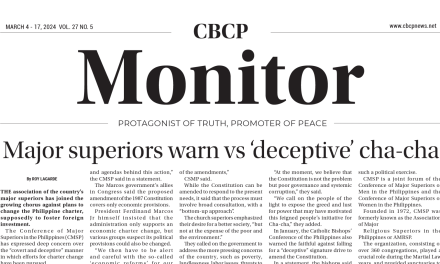
Lack of due discretion: An unexplored ground for the declaration of marriage nullity


FILE PHOTO
I HAVE observed the proliferation of so-called annulments in civil courts, on the ground of psychological incapacity. On the other hand, your column last September discussed what you perceived as “deficiencies of the Family Code of the Philippines,” especially as regards the absence of what in Canon Law is known as “grave lack of discretion of judgment concerning essential matrimonial rights and duties” as a ground for marriage nullity. Can you discuss this a little bit more?
Notion of Lack of Discretion of Judgment
Can. 1095, 2º of the Code of Canon Law states: They are incapable of contracting marriage, who suffer from grave lack of discretion of judgment concerning essential matrimonial rights and duties which are to be mutually given and accepted.
This basis of matrimonial nullity, as it has evolved in Rotal jurisprudence in the last half-a-century, looks at the harmonious integration of the intellect and the will, from which proceeds a conscious and free determination directed towards a certain object. As we have had a chance to consider on several occasions in this column, matrimonial consent—the most important of the three pillars on which the juridic structure of marriage stands—is a human act that demands the intervention of both the intellect and the will. Matrimonial consent is thus understood as deriving from a combined action of the cognitive, deliberative/critical, and volitional faculties. The contractant must know what is at stake; he must be capable of considering and evaluating the elements, properties, rights and obligations of this marriage to this person (the other contractant); and he must be free to want and choose this way of life with this particular person (the other contractant).
Aside from the obvious grounds of violence (whether internal or external) that vitiates the act of the will, and of ignorance or error (especially due to fraud) that vitiates the act of the intellect, Canon Law gives a lot of importance to the discretion of judgment as a necessary element for the validity of matrimonial consent. We can understand discretion of judgment as that quality of the intellect that allows a person to know what marriage means and what a specific marriage to a specific person here and now means, together with its consequences.
Definitely such discretion of judgment can be conceptually taken as an act of the intellect (since judgment is an act of the intellect), but it cannot be dissociated from the influence of the will and the passions, since in the last analysis the one who consents is the person—making use of his intellect and his will, while being affected by his passions.
Thus, for a valid act of consent, it is not enough to have information—i.e., a rudimentary knowledge of marriage and its responsibilities. In addition, one must have a practical comprehension—i.e., the judgmental capacity to evaluate what is being consented to, to elicit the act of consent and to fulfill what is involved or demanded by marriage. One must be able, in a sense, to look to the future—to see and assess the danger signals, which are obvious to family and friends and which are being commented on by them. In short, one must understand what this particular marriage, to this particular person, means for him. This discretion of judgment has been described variously as appreciatio seu aestimatio (appreciation or evaluation), facultas critica (critical faculty), judicium practicum (practical judgment).
While it is relatively easy to determine whether or not a person has the minimum knowledge required to give consent, the lack of discretion of judgment is not so clear cut. We are dealing, not so much with the cognitive powers of the person, as with his evaluative faculty, with his faculty to deliberate and to judge. Discretion implies maturity and judgment means decision. Discretion of judgment therefore means mature decision, which in turn presupposes the presence of adequate knowledge about the essential elements which constitute marriage—including the very persons of the contractants—and the internal freedom to deliberate and choose marriage without any interference.
Elements of Due Discretion of Judgment
Rotal jusrisprudence has isolated some of the elements of this decision: [1]
1st Adequate knowledge of the subjects (basically the persons of both contractants) and the object (basically the essential rights and obligations of marriage) of the marriage consent—a knowledge that is not merely speculative and cognitive, but practical and evaluative;
2nd Ability for critical reflection—which consists in putting judgments together in order to arrive at a new judgment or decision;
3rd Internal freedom—not only for critical reflection but also for making the final decision concerning the object. This means that the decision to enter marriage should be based on reasonable motives after sufficient deliberation and not on pathological or emotional motives; and the will is able to order the decision into execution.
Causes of the Lack of Due Discretion of Judgment
Lack of due discretion or poor judgment is often rooted in any of several factors:
1st is youthful immaturity;
2nd are emotional or psychological problems which may beset a party;
3rd are mentalities and attitudes pervading the socio-cultural milieu in which a party is immersed;
4th are factors such as fear or extreme pressure.
The first three are purely internal factors; the fourth can be both internal and external. The natural result of all this is that marriage is chosen in a state of mental and emotional confusion. [2]
A not-so-recent recent rotal decision indicated four general sources of emotional immaturity, the last two constituting veritable personality disorders: [3]
1st Immaturity connected with adolescence, to be distinguished from an immaturity rooted in the personality structure because the former is of a transitory nature. It can be understood as a lack of experience or exposure rather than as a personality defect.
2nd Immaturity found in some adults, manifested in some immature traits which have endured despite age and experience. These traits emerge as a lack of stability and consistency in holding options in certain areas of life, weakness of the will, infantile attitudes in certain situations, and a lack of control over emotions. Again, this immaturity does not necessarily point to a personality disorder, since some people do mature later than others.
3rd Immaturity that is a symptom of a personality disorder—e.g., hysteria or paranoia—frequently characterized by emotional instability, exaggerated sensitivity and lack of responsibility, etc.
4th Immaturity which emerges in the context of mental retardation, characterized by an exaggerated fixation on the parental image, the excessive need for protection, a lack of independence, narcissism, egoism, etc.
Mentalities and Attitudes that pervade the socio-cultural milieu in which a person is immersed can also undermine due discretion. For example, where family honor is a prominent cultural value, a person who has committed an act—e.g., pre-marital sex or a subsequent pregnancy—that would bring disgrace on the family if disclosed may feel compelled, even without external coercion, to marry in order to prevent damage to the family name.
This factor is especially relevant in the Philippine setting, especially with men. Given the practice of leaving the upbringing of children to the wife—with most husbands being content with providing for the economic needs of the family—most Filipino boys grow up without the necessary role model, much less the steady hand, that only a father could provide. It is thus a common phenomenon for Filipino boys to mature slower than their female counterparts. This is manifested not only in the common observation that women are outperforming men in the Philippines in almost all fields—even the Philippine Military Academy’s top ten graduating students are predominantly female—but even more importantly for our present topic, Filipino men are maturing later and suffer more from a lack of the due discretion of judgment for marriage. In effect, where most Filipinas are ready for marriage by the canonical age requirement of 18 years completed, most Filipinos at that age would still be playing computer games and would be hard-pressed to give a valid matrimonial consent with the due discretion of judgment.
Internal or External Pressure is a well-known factor causing a lack of due discretion. Given sufficient pressure, even mature and experienced people can make stupid and disastrous mistakes. Lesser pressure has a similar effect on less mature and less experienced people. In the case of marriage, given sufficient pressure on an immature person, the faculties of intellect and will can be so diminished as to render marital consent defective, and the marriage arising therefrom null.[4]
Traumatic events or stress-related experiences can induce psychological disturbances that temporarily deprive a person of the due discretion for marriage. Rotal jurisprudence has continued to issue affirmative decisions in cases where lack of due discretion is alleged, not only when the basis for the defect is a serious habitual mental disorder, but also when the defect is rooted in a serious but transitory disturbance of the mind. For example, a person can be temporarily deprived of due discretion by desperation arising from the need to flee an intolerable situation (e.g., an abusive home situation) or by extreme dependence on one’s parents arising from an infantile relationship.
Psychological Incapacity vs. Grave Lack of Discretion
The problem with using incapacity to assume due to causes of a psychic nature as a ground for nullity is its radical nature: in effect, what is being alleged is an intrinsic incapacity on the part of the party. Such incapacity is at least semi-permanent, which therefore affects the person also as regards any future marriage. Thus, a sentence of nullity due to this ground normally carries with it a provision (caveat) to the effect that the party who is suffering such incapacity is barred from contracting any future canonical marriage, unless he proves to the satisfaction of the competent authority that he/she has overcome whatever psychic reason there was that was causing such incapacity.
In contrast, grave lack of discretion of judgment is specific to the genesis of a particular consent, even if it may have been caused by psychological factors. In effect, when using c.1095, 2º as ground for nullity, what is proven is the momentary (or at least temporary) condition of grave lack of discretion of judgment in making the consent to marry, and not an incapacity to assume the essential marital rights and obligations. This presents a wider margin of possibilities, other than the strictly psychic reasons that would render a person incapable of assuming the essential rights and obligations of marriage.
It is high time for this cause to be used more often.
[1] Coram Pinto (18.XII.1979), in SRRD, 71 (1979), 587-588. Cf. A. Mendonça, The Effects of Personality Disorders on Matrimonial Consent, in Studia Canonica, 21 (1987), 86.
[2] Cf. A. Dacanay, Canon Law on Marriage, Loyola School of Theology, Manila (2000), p.104.
[3] Coram Stankiewicz (11.VII.1985), in Monitor Ecclesiasticus (1986), 163-172. This rotal judge in turn relies on J. McAreavey, Emotional Immaturity and Diocesan Pre-Marriage Policies, in Studia Canonica, 16 (1982), 283-330.
[4] Cf. A. Dacanay, op.cit., p.109.









